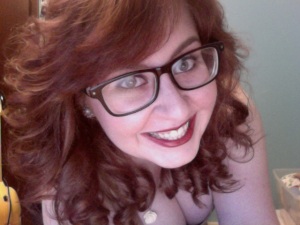Welcome to Query Week! Every day, this week and next, we’ll be publicly critiquing the queries you guys were awesome enough to send us last week. If we don’t publicly post yours, don’t worry, we’ll still email you our thoughts 🙂
See the bottom of our posts for great resources about queries, and use the tag ‘query week’ to see Query Weeks of the past.
~~~
Dear LTWF:
When Emily Bell is taken from school into London society, she is miserable. Leaving behind her life of books and magic to please her disapproving Mamma also means leaving charming Oliver Wycliffe, a boy she has known for some time and has come to love. She tries to hide her misery along with her magic, writing only portions of the truth to her best friend and her sister. It is only in her unsent letters to Oliver that she feels she can truly be herself, a self she is rapidly losing amidst the London fog.
Emily is jolted out of that fog when Oliver is turned into a white rabbit and disappears, and an untrustworthy magician by the name of Mr. Stanton asks for her assistance with a spell. She discovers that her spell is to be used for dark purposes, and she is the only one who can stop him. Desperate to find Oliver before she loses her love to a cat, and feeling guilty for her rash decision to help Mr. Stanton, Emily must disobey her mother and use her magic. But it also means leaving the safety of her books and risking everything – and Emily’s newfound strength might not be up to the task.
LETTERS TO OLIVER is a YA historical fantasy in epistolary form, complete at 60,000 words, which I hope will appeal to fans of A GREAT AND TERRIBLE BEAUTY and SORCERY & CECELIA.
I am also working on another YA novel which involves the French Revolution and werewolves.
Thank you for your time and consideration.
Sincerely,
Caitlin R. O’Connell
~~~
 Oooh, I love the premise behind this! Sorcery & Celia was one of my favorites growing up!
Oooh, I love the premise behind this! Sorcery & Celia was one of my favorites growing up!
Overall, I think this is good, but I feel like I need to understand the basics of the world for the query to make sense. Magic…is illegal? I mean, why does her Mama want her to stop? What kind of magic is it — wands, pentagrams, or incantations?
I think, to include this necessary information, you’ll need to also tighten your paragraphs (otherwise the query will be running too long). But tightening will also give you smoother flow and more snap!
For example, paragraph 1 can be condensed to:
“After her mother drags her into London society, Emily Bell is miserable. She had to leave behind her books and her magic, and worst of all, she had to leave her love — the charming Oliver Wycliffe.
<insert world information, like: The year is ___, and magic is common enough for gypsies and street vendors, but it is absolutely inappropriate for a lady of high society. And though Emma tries to ignore the magic itching in her fingertips and the aching in her heart, she finds she is rapidly losing herself in the dreary London fog and social demands.>”
Now, with regards to my confusion over the story, when you say, “Emily is jolted out of that fog when Oliver is turned into a white rabbit and disappears, and an untrustworthy magician by the name of Mr. Stanton“, I feel like I need to know WHY Oliver got turned into a rabbit and WHO Mr. Stanton is — why would Emily trust an untrustworthy magician?
Next, you say, “She discovers that her spell is to be used for dark purposes, and she is the only one who can stop him.” Specifics would be helpful here: what sort of spell and what are the dark purposes? Without specifics, I don’t know what’s at stake or why I should care. 🙂 What Emily considers dark may not be what I consider dark! Also, why is Emily the only one who can stop him?
When you say, “Emily must disobey her mother and use her magic“, I got confused because hasn’t she already disobeyed her mother? Didn’t she use magic if she was helping Mr. Stanton?
At the end of the pitch, you say, “But it also means leaving the safety of her books and risking everything – and Emily’s newfound strength might not be up to the task.” I thought she already left behind her books when she moved to London, no? Also, I don’t think you mentioned Emily developing a strength during the story — so I don’t think you can talk about her “new-found strength”. I think you can just say, “Emily might not be up to the task.” Then we know she has to build strength or fail. 🙂
Finally, you mention the book you’re working on right now. Normally, this should not be mentioned. Unless an agent specifically asks to hear about your other novels (and some do!), then I wouldn’t waste your precious page space mentioning it. 🙂
Good luck with this, and please let us know how your querying goes!
~~~
 I have to agree with Susan — this story sounds awesome! I’m such a sucker for history and magic, so combining them is even better! Kudos on an awesome premise!
I have to agree with Susan — this story sounds awesome! I’m such a sucker for history and magic, so combining them is even better! Kudos on an awesome premise!
Overall, your query is good; if you sent it out now, you’d probably get a few nibbles. But as Susan mentioned, tightening up the paragraphs you have, in order to include more relevant information, is key. The thing with queries is that you have to make the stakes high. Right now my interest is piqued, but I don’t feel any urgency, you know? You did a good job in picking three characters to name in your query, but I want to know more about Oliver, and I want to know more about Mr. Stanton. What makes Oliver worth fighting for? And why has he been turned into a rabbit? Is he hiding a secret as well? If he is, mention it! Up the ante. As for Mr. Stanton, what is he up to and why? As Susan mentioned, why is Emily the only one capable of stopping him?
I was also a little confused by this line: “Desperate to find Oliver before she loses her love to a cat…” Are you referring to Mr. Stanton or an actual cat? Since Oliver’s been turned into a rabbit, it’s possible that this cat could be someone else entirely. Never leave room for ambiguity when it comes to things like this.
Also, don’t forget to include a sentence or two about why you’re querying this particular agent. It lets them know you did your research, and you’d be surprised how far that can get you.
Good luck!
~~~

Again, like yesterday, my notes are in blue! 😀
Dear LTWF:
When Emily Bell is taken from school into London society, she is No need to cut out contractions in a query. In fact, unless you’re going for a rather formal air (which could be what you’re going for since this is historical), I’d say use those contractions. I think they make your writing seem less formal and stuffy–more inviting miserable. Leaving behind her life of books and magic why’s she leaving behind her magic? Did she go to a magic school? to please her disapproving Mamma also means leaving charming Oliver Wycliffe, a boy she has known for some time and has come to love “has known for some time and has come to love” doesn’t seem strong enough for me. Emily is miserable. Her feelings are strong. Try to infuse some of her voice into this. How does she feel about leaving Oliver behind? What will she miss about him? “Charming” is rather vague. There’s nothing wrong with it, but imagine how much character and voice you could add if you were a bit more specific. She tries to hide her misery along with her magic, writing only portions of the truth to her best friend and her sister. It is only in her unsent letters to Oliver that she feels she can truly be herself, a self she is rapidly losing amidst the London fog. I like that imagery!
Emily is jolted out of that fog when Oliver is turned into a white rabbit and disappears, and an untrustworthy magician by the name of Mr. Stanton asks for her assistance with a spell Are these two related? If so, may want make the connection clearer. She discovers that her spell is to be used for dark purposes bit vague, and she is the only one who can stop him. Desperate to find Oliver before she loses her love to a cat, no need for this comma and feeling guilty for about her rash decision to help Mr. Stanton, Emily must disobey her mother and use her magic. But it also means leaving the safety of her books and risking everything – and Emily’s newfound strength might not be up to the task.
LETTERS TO OLIVER is a YA historical fantasy in epistolary form, complete at 60,000 words, which I hope will appeal to fans of A GREAT AND TERRIBLE BEAUTY and SORCERY & CECELIA.
Overall, sounds like a great read 🙂 I think you need to make the main conflict a little more clear, though. Mr. Stanton sounds like the Big Bad, but I need to know more about what he’s up to. “Dark purposes” just doesn’t cut it 😛 What are the stakes if Emily fails to stop him? How is all this related to Oliver?
I am also working on another YA novel which involves the French Revolution and werewolves.
Thank you for your time and consideration.
Sincerely,
Caitlin R. O’Connell
~~~
Helpful Links
Queries and Cover Letters, from the Elaine P. English literary agency blog
Query Letter Mad Lib, from literary agent Nathan Bransford’s blog
How to Format a Query Letter, also from Nathan Bransford’s blog
Query Shark, where literary agent Janet Reid tears apart your queries and puts them back together
AgentQuery gives their advice on what makes up a good query letter
A Complete Nobody’s Guide to Query Letters, a good article from Science Fiction Writers of America
Tags: queries, query week





 by
by 



 Sounds like a very romantic story! Overall, though, I feel like you would benefit from some lessons/articles/books on query-writing. I say this because 1) this letter doesn’t follow the expected query formula, and 2) you are committing some “no-nos” that are well-known and easy to avoid.
Sounds like a very romantic story! Overall, though, I feel like you would benefit from some lessons/articles/books on query-writing. I say this because 1) this letter doesn’t follow the expected query formula, and 2) you are committing some “no-nos” that are well-known and easy to avoid.



 LTWF Facebook
LTWF Facebook LTWF Twitter
LTWF Twitter